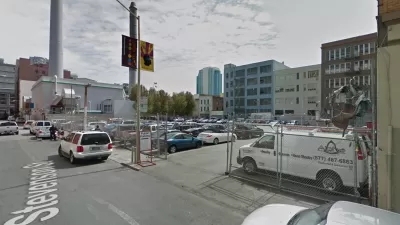A solar energy facility planned for Fairfield County, Ohio is in critical condition after local governments express their displeasure.

Ohio Power Siting Board (OPSB) staff have recommended against allowing a new solar energy facility in Greene County, Ohio, based on concerns about protecting the “rural aesthetics” of the area.
“Opposition from local governments, primarily concerned about the rural aesthetics of the area, trump the Kingwood Solar’s signed leases with landowners, the payroll and tax benefits for locals, and clean electricity for the grid,” reports Jake Zuckerman for the Ohio Capital Journal on the latest development in the ongoing controversy.
OPSB could still overrule the staff recommendation, however. The staff’s recommendation reverses an earlier draft recommendation, reports Zuckerman, after local politicians voiced their displeasure. According to Zuckerman, the episode “underscores locals’ ability to thwart renewable projects, an ability that doesn’t apply for fossil fuels.”
“In 2015, the Ohio Supreme Court overturned Munroe Falls’ ordinances seeking to ban fracking, determining the state has ‘sole and exclusive authority’ as to the regulation of oil and gas wells,” according to the article.
Zuckerman reported in a separate article earlier in August that ten Ohio counties have passed laws to prohibit the development of solar and wind energy after following a new state law granting local control over the issue.
More on the consequences of a potential rejection of the solar plant’s permit are included in the source article.
FULL STORY: Ohio May Soon Kill a Solar Project Due to Concerns Over 'Rural Aesthetic'

Study: Maui’s Plan to Convert Vacation Rentals to Long-Term Housing Could Cause Nearly $1 Billion Economic Loss
The plan would reduce visitor accommodation by 25,% resulting in 1,900 jobs lost.

North Texas Transit Leaders Tout Benefits of TOD for Growing Region
At a summit focused on transit-oriented development, policymakers discussed how North Texas’ expanded light rail system can serve as a tool for economic growth.

Why Should We Subsidize Public Transportation?
Many public transit agencies face financial stress due to rising costs, declining fare revenue, and declining subsidies. Transit advocates must provide a strong business case for increasing public transit funding.

How to Make US Trains Faster
Changes to boarding platforms and a switch to electric trains could improve U.S. passenger rail service without the added cost of high-speed rail.

Columbia’s Revitalized ‘Loop’ Is a Hub for Local Entrepreneurs
A focus on small businesses is helping a commercial corridor in Columbia, Missouri thrive.

Invasive Insect Threatens Minnesota’s Ash Forests
The Emerald Ash Borer is a rapidly spreading invasive pest threatening Minnesota’s ash trees, and homeowners are encouraged to plant diverse replacement species, avoid moving ash firewood, and monitor for signs of infestation.
Urban Design for Planners 1: Software Tools
This six-course series explores essential urban design concepts using open source software and equips planners with the tools they need to participate fully in the urban design process.
Planning for Universal Design
Learn the tools for implementing Universal Design in planning regulations.
Ascent Environmental
Borough of Carlisle
Institute for Housing and Urban Development Studies (IHS)
City of Grandview
Harvard GSD Executive Education
Toledo-Lucas County Plan Commissions
Salt Lake City
NYU Wagner Graduate School of Public Service





























